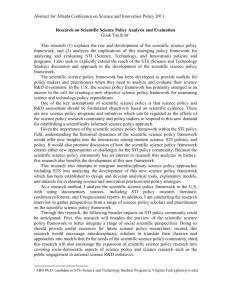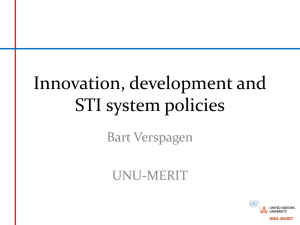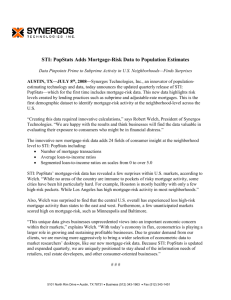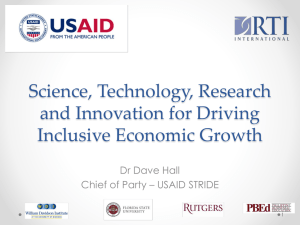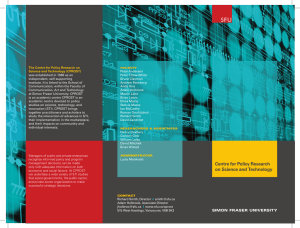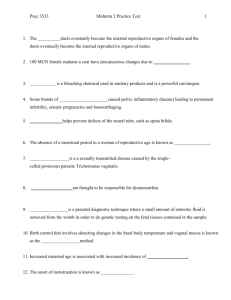UNCTAD Meeting Dr Gabriela Dutrénit
advertisement
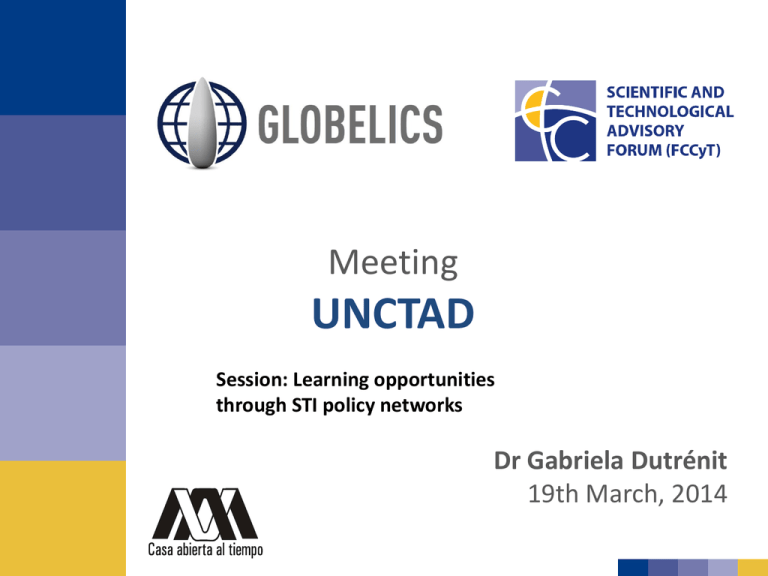
Meeting UNCTAD Session: Learning opportunities through STI policy networks Dr Gabriela Dutrénit 19th March, 2014 From governmental policies to public policies of STI The STI advisory organisations Learning through networking in LAC Tensions identified in the STI sector that affect the operation of these advisory organizations Strategic issues for the advisory organisations to foster learning and interaction with policy-making The incidence of Globelics, and the Lics, on STI communities 2 From governmental policies to public policies of STI Governmental policy: top-down focus Public policy: involvement of communities This process brings institutional, organizational and legal tensions within the STI sector 3 Advisory and consultative organisations on STI policies in LAC • Consejo Nacional de Innovación para la Competitividad (CNIC), Chile • Observatorio de Ciencia y Tecnología (OCT), Colombia • Centro de Gestión y Estudios Estratégicos (CGEE), Brasil • Foro Consultivo Científico y Tecnológico (FCCyT), México • Foro Nacional Internacional, Perú • Fundación Comisión Asesora en Alta Tecnología (CAATEC), Costa Rica • Consejo Nacional de Innovación, Ciencia y Tecnología (CONICYT) 4 The STI advisory organisations: Learning through networking in LAC Workshop of advisory organisations on STI policies in LAC: 24-25 October 2013 Objective: • exchange of experience between advisory and consultative bodies of STI policy representing communities on the functions performed, • extract lessons learned, • make recommendations on how best to represent the voice of communities and help generate public policy CTI . 5 Other participants from countries within an advisory organisation: • Asociación Panameña para el Avance de la Ciencia (APANAC), Panamá • Secretaría de Planeamiento y Políticas, Ministerio de Ciencia, Tecnología e Innovación Productiva, Argentina • Ministerio de Educación Superior, Cuba • Asociación Salvadoreña de Altos Estudios Estratégicos, El Salvador • Asociación Panameña para el Avance de la Ciencia • Ministerio de Educación Superior, Ciencia y Tecnología, República Dominicana Internacional organisations: • BID • CEPAL • Mexican representation at the OCDE 6 Relevant roles Consulting organisation of different actors (government, communities of STI) Articulation between actors Response to demands of the STI agency Think tank for the STI strategy Lobbying and persuasion Tensions identified in the STI sector that affect the operation of these advisory and consultative organizations Between the political arena and the STI policies arena Within the STI sector: between the scientific and entrepreneurial communities Between: The policy makers in STI Other ministries involved in STI The regional governments Between the different incentives oriented to mould the behaviour of academic researchers and firms Between a short term approach oriented to existing demands, and a long term approach required for strategic thinking (i.e. think tank) Strategic issues for the advisory and consultative organizations to foster learning and interaction with policymaking Need to improve the dialogue process in order to truly represent the communities Dialogue with all the STI actors Build different approaches Two-way dialogue with the communities in order to build public policy Contribute to the coordination/articulation of actors in key issues for the STI sector in the country (private sector, public sector & academia) Respect individual agendas of the actors in the STI system while contribute to building a common agenda Need to be connected with the political agenda Innovation and value creation: demonstrate to the Ministry of Finance that STI can contribute to generate value and solve national problems The need to build capacities for strategic thinking and be able to act as a Think Tank on STI policies Avoid agency problems in the processes of decision making and implementation Separate the process of policy design from the pressures coming from captive actors Promote the use of evidence by the policy makers Some other issues: How to define the focus of the strategy? Who define this focus? 10 Be aware of potential changes in the Governance of the STI system Broadening international networks with affiliated organizations and international organizations Greater interaction with similar organizations to learn from the experiences GLOBELICS: our incidence on STI communities and policy making in STI Globelics – www.globelics.org Global network on the Economics of learning, innovation and competence building Systems The purpose To contribute to academic capacity building in the South linking the fields Innovation studies and Development studies – to each other. To contribute to knowledge based development strategies and policies linking innovation to economic development. A platform for South-South collaboration. from 2001 Assumptions Economic development is seen as an evolving process innovation is one of the key determinants for developed and developing countr Global networks are a powerful tool to promote academic work and influence the design of evidence-based policies LICs: regional networks • LIC means: Learning Innovation and Competence building systems Asialics Lalics (http://lalics.org/) Africalics Chinalics Indialics Metalics Mode of operation: networking Low cost and informal structure – a scientific board and a Globelics secretariat in Denmark Regional chapters with Lalics secretariat in Mexico and the Africalics secretariat in Nairobi. Big names come as speakers with their own funding for travel to conferences and academies. Local and regional funding gives commitment!! Support for travel from the South and for activities in Africa from Sida, Sweden and IDRC, Canada. Impact Affecting the research agenda locally Exploiting synergies globally and regionally Affecting the policy agenda (President in Senegal and the Vice President in Argentina opened Globelics conferences) The Scientific board members are active as top level advisors on innovation and development. Several have served as deputy ministers. Our incidence mostly through experts who are involved in the policy-making or in advise to the policymaking 18 Follow us: www.globelics.org lalics.org

